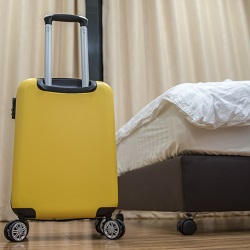Lending an ear
Geriatric patients were eager to use assistive listening devices during hospitalization.
Background
The effort to help patients at SUNY Upstate Medical University Hospital hear more easily began when Karen Doherty, PhD, an audiologist and professor at Syracuse University, was visiting a patient in a double room and overheard a physician giving a serious diagnosis to a patient who couldn't hear well.

“The physician had a heavy accent, and the patient really just could not hear. … When one of his family members came back into the room, she said, ‘What did the doctor tell you?’ All he took from the interaction was that he needed more tests, but in fact the doctor was saying, ‘You have cancer and need more tests,’” explained Marissa Merrifield, BS, a PhD candidate in audiology at Syracuse University.
To try to improve the situation, Dr. Doherty, who is Ms. Merrifield's mentor and coauthor, teamed up with a geriatrician who had also experienced difficulty communicating with her patients, such as needing to raise her voice to get her patients to hear her. “That comes with its own challenges, because then the whole floor may be hearing their diagnosis,” Ms. Merrifield said.
How it works
Their solution was an assistive listening device, the Williams Sound Pocketalker Ultra, a small amplifier with headphones and volume control. The devices were offered to hospital patients ages 60 years and older to use during their stay. If a patient opted to take one, a sign was taped over their bed alerting hospital staff that the patient had an assistive listening device.
“Getting the physicians on board and aware of these devices is a very important, but challenging, step in this process,” said Ms. Merrifield. In fact, patients surveyed about their device experience reported that they weren't able to use them as much as they would have liked with their physicians because they didn't have time to put them on.
Results
Overall, however, patients were highly satisfied with the devices, according to a survey of 34 who represented the initial pilot of the project. Almost all participating patients (96%) reported that the device was easy to use and 88% found it helpful, according to results published by the Journal of Hospital Medicine on Dec. 19, 2024. Eight of the patients had hearing aids that they had left at home, and six had previously owned hearing aids but didn't currently wear them.
“We were very pleased with how well received these devices were,” said Ms. Merrifield. “The patients were happy to have it and used it quite frequently with hospital staff and when their family members came in to visit them.”
Family members were actually the group patients reported most commonly using the devices with, followed by hospital staff and then physicians. Several family members told the audiology researchers that communication was so improved with the device they wanted to buy one for the patient's use after discharge, she said.
Challenges and next steps
The biggest challenge to an intervention like this is getting a hospital to buy and implement the devices in hospital rooms, noted Ms. Merrifield. “If you are going to put that money into it, you want to make sure they're going to be well utilized, and this study suggests they will be.”
At Upstate University Hospital, the solution after the study was completed was to provide each geriatrician with an assistive listening device to use with all their patients. “That's a really good start, and the geriatricians were very thankful to receive that funding,” she said. “But in the future, it would be good to see the devices in the patients' rooms, because we did find that patients were very excited and happy to use it with their family members, as well as the nurses, care aides, and people coming in and out of their room.”
Words of wisdom
One accomplishment of the project was simply bringing physicians' attention to the difficulty patients may be having hearing them and the importance of doing something about that if they can, and another was demonstrating the importance of good communication between patients and their visitors, according to Ms. Merrifield.
“It may be overlooked in the grand scheme of things,” she said. “Hearing loss is very common in older adults, and since older adults make up a vast majority of hospital inpatients, it's something that really should be explored further.”



